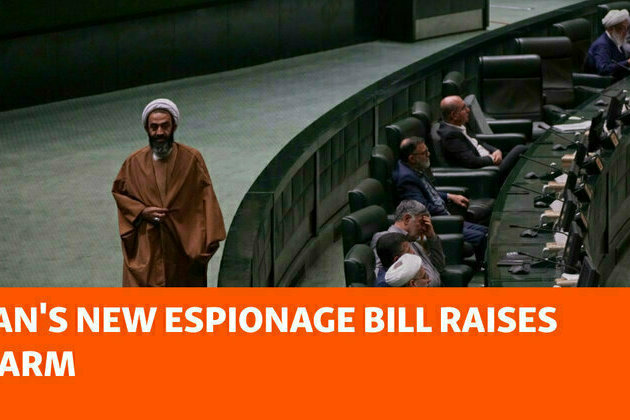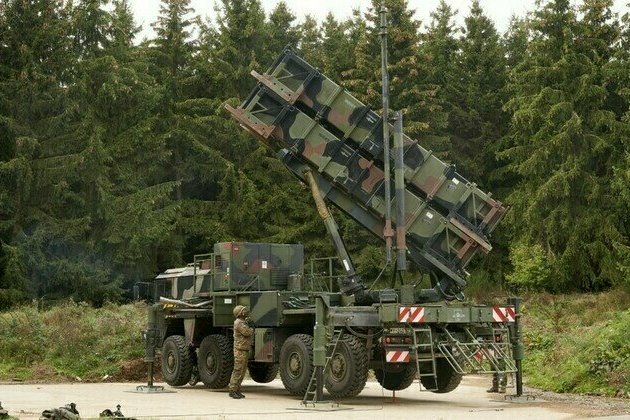Fears Of More Executions As Iran's New Espionage Bill Raises Alarm
RFE
04 Jul 2025, 15:38 GMT+10

Welcome back to the Farda Briefing, an RFE/RL newsletter that tracks the key issues in Iran and explains why they matter.
I'm RFE/RL correspondent Kian Sharifi. In this edition, Im looking at why the Iranian parliament's passage of a bill imposing harsher penalties for espionage has raised concerns.
What You Need To Know
Widening Use Of The Death Penalty:Over the weekend, Irans parliament passed a bill imposing significantly harsher sentences for espionage and collaboration with hostile foreign governments, particularly targeting activities linked to Israel and the United States. Legal experts and human rights organizations warn that the laws broad definitions and severe punishments could lead to arbitrary accusations and mass executions, including for activities that previously carried lesser sentences or would not have been considered espionage.
Cooperation With UN Nuclear Watchdog Suspended:President Masud Pezeshkian this weekenacteda law to suspend Irans cooperation with the International Atomic Energy Agency (IAEA), alarming European powers who called the move "disastrous." Suspending cooperation with the IAEA means Iran will halt inspections, reporting, and oversight activities under the Treaty on the Non-Proliferation of Nuclear Weapons (NPT). Western nations caution that reducing IAEA visibility risks triggering renewed sanctions and significantly heightens nuclear proliferation concerns.
Will China Give Iran What Russia Wont?Following its air defense failure during the recent conflict with Israel, Iran is seeking to modernize its outdated air force. Disappointed by Russias reluctance to deliver Sukhoi-35 jets -- despite a strategic partnership -- Iran is nowlooking toChina for advanced J-10C fighter jets. However, Beijing is cautious, balancing ties with Persian Gulf states and US pressure, and may prefer economic over military support. With both Russia and China prioritizing their own interests, Iran faces increasing strategic isolation and limited options to rebuild its aerial capabilities.
The Big Issue
Pictures of people's eyes lie amid the rubble of a residential building that was hit in an Israeli strike, in Tehran
Death For Dissent
The passage of this bill comes in the aftermath of a brief but intense conflict with Israel and the United States, during which Iranian authorities have already executed several individuals accused of spying for Israel and detained hundreds more.
The legislation covers a wide range of activities, including intelligence gathering, operational cooperation, providing military, financial, or technological support, as well as manufacturing military drones, conducting cyberattacks, or sabotaging infrastructure for enemy states -- even if such actions are ineffective.
As part of the approved measures, espionage and collaboration with Israel, the US, or other hostile states are now classified as corruption on Earth, a charge that automatically carries the death penalty under Iranian law.
The bill also criminalizes a broader set of interactions, such as sharing images or videos with foreign media, publishing false news, or producing content that authorities claim threatens national security or public morale, with penalties ranging from lengthy prison sentences to execution
It also explicitly criminalizes the use, possession, sale, purchase, import, production, and distribution of Starlink satellite Internet devices. Possession or use of a Starlink terminal can result in six months to two years in prison
Why It Matters:The recent war with Israel exposed Mossads deep reach into Iran. Israels foreign intelligence service has shown clear dominance over Irans security apparatus, apparently prompting the bills passage.
Proponents have justified the new measures as necessary to counter foreign infiltration and threats to national security, but critics argue that the new law will likely be used to suppress dissent and target marginalized groups.
The bill also covers all Internet and communications equipment not certified by the Iranian government, but Starlink is specifically named as a threat due to its ability to bypass state censorship and surveillance.
The authorities fear Starlink enables clandestine contact with foreign intelligence, particularly Israel and the United States, and undermines state control over the flow of information.
To become law, the bill needs to be approved by the Guardian Council -- Irans constitutional watchdog - before it can be enacted by the government.
What's Being Said:The bill was passed unanimously by the conservative-leaning parliament, with no abstentions. But it has been widely criticized by legal experts andrights groups.
Tehran-based lawyer Mohsen Borhani wrote on X that the passage of the bill was an ugly joke and its contents violate legal and religious principles.
Dadban, a collective of lawyers that consult activists, expressed concern with the bills retroactive application, allowing death penalties for acts not previously punishable, such as propaganda against the establishment or collaboration with hostile media.
It added that the bill introduces vague definitions of "espionage" and "collaboration with enemies," potentially endangering activists and journalists.
Political analyst Babak Dorbeiki told RFE/RLs Radio Farda that the passage of the bill was so shocking he initially thought it was knee-jerk reaction to the war with Israel.
But when you read the bill, you realize it is just a strange way of seeking vengeance, he said.
Dorbeiki argued that the bill would also allow those in power to target their critics and neutralize them.
This will be dangerous to not only critics of the Islamic republic, but also supporters who want to reform it, he added.
Expert Opinion:This bill fundamentally contradicts the principles of criminal law, Shi'ite jurisprudence, and the constitution, legal expert Moein Khazaeli told Radio Farda, specifically criticizing its potential retroactive application if passed.
That's all from me for now.
Until next time,
Kian Sharifi
If you enjoyed this briefing and don't want to miss the next edition, subscribehere. It will be sent to your inbox every Friday.
 Share
Share
 Tweet
Tweet
 Share
Share
 Flip
Flip
 Email
Email
Watch latest videos
Subscribe and Follow
Get a daily dose of Greek Herald news through our daily email, its complimentary and keeps you fully up to date with world and business news as well.
News RELEASES
Publish news of your business, community or sports group, personnel appointments, major event and more by submitting a news release to Greek Herald.
More InformationInternational Business
SectionOver 60 companies named in UN report on Israel-Gaza conflict
GENEVA, Switzerland: A new United Nations report alleges that dozens of global corporations are profiting from and helping sustain...
Persson family steps up H&M share purchases, sparks buyout talk
LONDON/STOCKHOLM: The Persson family is ramping up its investment in the H&M fashion empire, fueling renewed speculation about a potential...
Shell rejects claim of early merger talks with BP
LONDON, U.K.: British oil giant Shell has denied reports that it is in talks to acquire rival oil company BP. The Wall Street Journal...
Trump-backed crypto project gets $100 million boost from UAE fund
LONDON, U.K.: A little-known investment fund based in the United Arab Emirates has emerged as the most prominent public backer of U.S....
Australian PM rejects US pressure to ease biosecurity rules
SYDNEY, Australia: Australia will not ease its strict biosecurity rules during trade talks with the United States, Prime Minister Anthony...
Russia's international reserves hit all-time high - central bank
The country's holdings have risen by nearly $10 billion over the past month, official data shows ...
Mediterranean
SectionTurkey, France battle wildfires amid early Europe heatwave
ISTANBUL/PARIS/BRUSSELS: As searing temperatures blanket much of Europe, wildfires are erupting and evacuation orders are being issued...
Apple allows outside payment links under EU pressure
SAN FRANCISCO, California: Under pressure from European regulators, Apple has revamped its App Store policies in the EU, introducing...
Fears Of More Executions As Iran's New Espionage Bill Raises Alarm
Welcome back to the Farda Briefing, an RFE/RL newsletter that tracks the key issues in Iran and explains why they matter. I'm RFE/RL...
Germany looking to secretly buy US arms for Ukraine Bild
The freeze in deliveries of some American weapons to Kiev is causing alarm in Berlin, the paper has reported Germany wants to agree...
"PM Modi is receiving honours because country improved relations with everyone in last 70-75 years": Pawan Khera
New Delhi [India], July 4 (ANI): Congress leader Pawan Khera on Friday aimed Prime Minister Narendra Modi over his recent visit to...
"China provided all support to Pakistan." Deputy COAS reveals Pak-China tango during Op-Sindoor
New Delhi [India], July 4 (ANI): Deputy Chief of Army Staff (Capability Development and Sustenance), Lieutenant General Rahul R Singh,...












